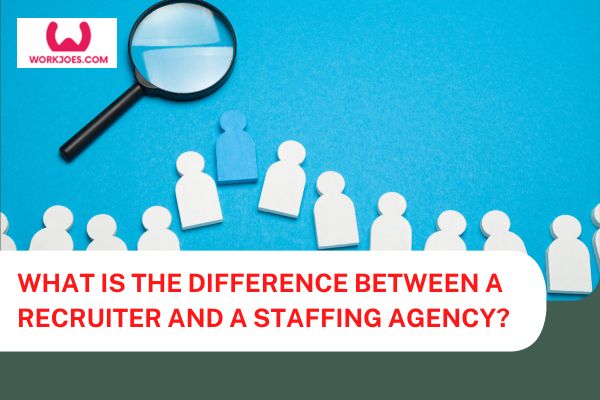In today’s competitive job market, finding and securing the right talent is crucial for the success of any organization. Two essential players in the talent acquisition landscape are recruiters and staffing agencies.
While both are instrumental in connecting employers with potential candidates, their roles and functions differ significantly.
In this blog, we analyze the key difference between a recruiter and a staffing agency.
Understanding Recruiters:
Recruiters are professionals specialized in talent acquisition, working on behalf of employers to identify and engage suitable candidates for job openings within their organizations. They act as intermediaries between companies and job seekers, facilitating the hiring process and ensuring the best fit for both parties.
Role and responsibilities of recruiters:
Building relationships with clients and candidates:
Recruiters establish and maintain strong connections with hiring managers and HR departments within client organizations. They also develop rapport with potential candidates, understanding their career goals and preferences.
Conducting candidate sourcing and screening:
Recruiters actively seek out potential candidates through various channels, including job boards, social media, and professional networks. They meticulously screen applicants based on qualifications, experience, and cultural fit.
Coordinating and managing the hiring process:
Throughout the hiring journey, recruiters coordinate interviews, handle logistics, and act as liaisons between employers and candidates. They also provide timely updates and feedback to both parties.
Providing personalized services and career guidance:
Recruiters offer individualized attention to candidates, assisting them in preparing for interviews, providing insights into company culture, and guiding them through the hiring process.
What Is an Executive Search Firm?
Pros and cons of Recruiters:
Pros:
- Personalized approach: Working with a dedicated recruiter ensures a more personalized and tailored hiring experience.
- In-depth understanding: Recruiters often have extensive knowledge of the job market and industry-specific insights, which can benefit both candidates and employers.
Cons:
- Limited resources: Individual recruiters may have limited access to a smaller pool of candidates compared to staffing agencies.
- Longer recruitment cycles: The personalized nature of the process might lead to longer recruitment cycles, which could be a disadvantage in time-sensitive situations.
What is a Staffing Agency:
A staffing agency is a specialized firm that assists companies in finding suitable candidates for their job vacancies. Unlike individual recruiters, staffing agencies operate as third-party entities with an extensive network of candidates and employers.
They offer a range of staffing solutions, including temporary, contract, and permanent placements. Some examples are such as willsourcestaffing.com. Randstad, The Adecco Group.
Role and responsibilities of staffing agencies:
Partnering with companies to fulfill hiring needs:
Staffing agencies collaborate closely with client companies to understand their specific hiring requirements, organizational culture, and long-term goals. This partnership allows them to source candidates that align with the company’s vision.
Maintaining a database of pre-screened candidates:
Staffing agencies maintain an extensive database of pre-screened candidates with varying skill sets and experiences. This ready pool of talent enables them to quickly match candidates to job openings, reducing the time-to-hire for employers.
Managing temporary or contract staffing requirements:
In addition to permanent placements, staffing agencies excel in providing temporary or contract staffing solutions. They identify qualified candidates to fill short-term or project-based roles, offering flexibility to companies during peak seasons or special projects.
Handling administrative tasks and payroll for temporary workers:
For temporary and contract workers, staffing agencies take care of administrative tasks such as onboarding, payroll processing, taxes, and benefits. This allows the client companies to focus on their core business activities.
What is Virtual HR (Human Resources)? Pros & Cons Explained
Pros and cons of a staffing agency:
Pros:
- Wider candidate reach: Staffing agencies have a large database of candidates who are already sorted based on different criteria. It helps save time for the employer.
- Flexibility: Temporary and contract staffing options provide companies with the flexibility to adjust their workforce based on changing business demands.
- Administrative support: Staffing agencies handle administrative tasks and legal compliance for temporary workers, reducing the burden on client companies.
Cons:
- Less personalized approach: Staffing agencies may not offer the same level of individualized attention and career guidance as dedicated recruiters.
- Higher costs: Engaging with a staffing agency often involves additional fees and markups on the temporary worker’s salary, which can increase hiring costs for companies.
- Potential turnover: Temporary workers provided by staffing agencies might have a higher turnover rate, leading to the need for more frequent replacements.
Difference Between a Recruiter and a Staffing Agency
Nature of the relationship with clients and candidates:
Recruiters: Recruiters typically establish a one-on-one relationship with both clients (employers) and candidates. They focus on understanding the unique needs and preferences of each party to facilitate more personalized matches.
Staffing Agencies: Staffing agencies act as intermediaries between clients and candidates, managing a broader network of employers and potential hires. Their relationship tends to be more transactional, emphasizing efficient placements to meet hiring demands.
Scope of services provided:
Recruiters: Recruiters primarily focus on permanent placements, assisting companies in finding long-term employees who fit well into the organizational culture.
Staffing Agencies: In addition to permanent placements, staffing agencies offer temporary and contract staffing solutions, providing companies with flexible workforce options to manage varying workloads and projects.
Business models and fee structures:
Recruiters: Recruiters are often paid on a contingency or retained basis, receiving a fee only when a successful hire is made. The fee is typically a percentage of the candidate’s first-year salary.
Staffing Agencies: Staffing agencies generally charge a markup on the hourly or monthly pay rate of the temporary or contract workers they provide. The markup covers administrative costs and the agency’s profit.
Flexibility in meeting hiring needs:
Recruiters: Recruiters are adaptable to the specific needs and preferences of their clients. They tailor their search and selection process to find candidates who best match the company’s requirements.
Staffing Agencies: Staffing agencies excel in providing quick and flexible staffing solutions. They can promptly supply temporary or contract workers to meet short-term or urgent staffing demands.
Timeframes for filling positions:
Recruiters: The hiring process through recruiters may take more time due to the personalized approach and thorough candidate evaluation. It might be ideal for companies looking to make strategic long-term hires.
Staffing Agencies: Staffing agencies can often fill positions more rapidly, especially for temporary or contract roles, as they already have a pool of pre-screened candidates readily available.







